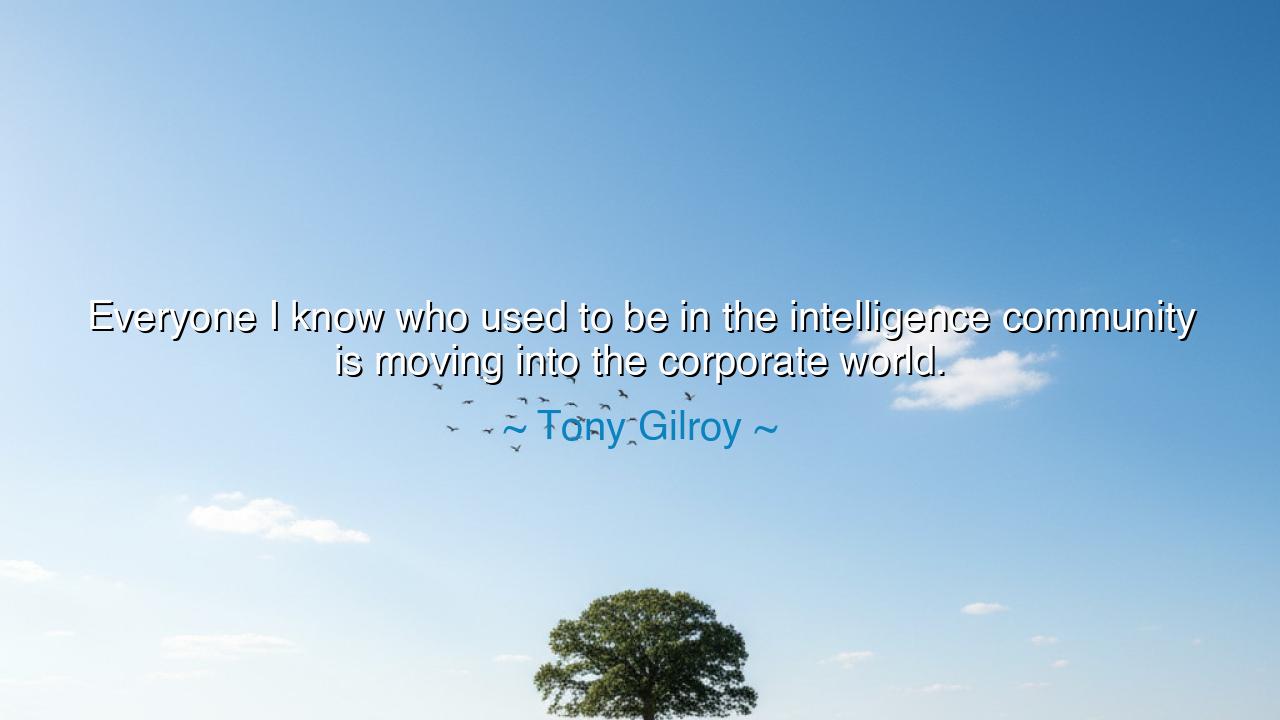
Everyone I know who used to be in the intelligence community is
Everyone I know who used to be in the intelligence community is moving into the corporate world.






The words of Tony Gilroy, spoken with insight sharpened by his years of storytelling and observation, strike at the heart of a transformation both quiet and profound: “Everyone I know who used to be in the intelligence community is moving into the corporate world.” On the surface, these words describe a change in profession, a migration of skill from one domain to another. Yet beneath them lies a deeper reflection — on the nature of power, on the shifting boundaries between statecraft and commerce, and on the eternal question of loyalty and purpose. Gilroy, a craftsman of tales that expose the moral shadows of modern systems, here reveals a truth that transcends any single era: that when the guardians of secrets turn their gaze toward profit, the soul of intelligence itself is tested.
From the dawn of civilization, the intelligence community — those who watch unseen, who gather knowledge in silence — has been bound to the service of nations. In ancient Egypt, scribes and informants whispered in the courts of Pharaoh. In imperial China, networks of spies stretched from the palaces of the Han to the edges of the Silk Road. Their loyalty, however divided or conflicted, was to the sovereign, to the stability of the realm. But in Gilroy’s time, as in ours, the world has changed. The centers of influence no longer lie only in palaces or parliaments — they now reside in boardrooms and data towers, where corporations wield resources and reach that rival empires. When he speaks of those who once served the shadows of government now serving the shadows of commerce, he is naming a new age: an age in which intelligence has become a currency, and knowledge the most coveted weapon of all.
Consider the historical mirror of this truth — the fate of the Venetian Republic, that master of trade and espionage. Venice, the merchant empire of the Renaissance, thrived not through conquest of land, but through the conquest of information. Its merchants and spies were one and the same: men who gathered secrets of prices, treaties, and technologies, using intelligence not for kings, but for profit. The Venetian state itself became indistinguishable from its commerce. And though Venice shone brightly for centuries, its glory waned when profit began to outweigh principle. The lesson of Venice — like Gilroy’s observation — is this: when intelligence becomes a commodity, loyalty becomes uncertain, and the balance of morality begins to tremble.
Gilroy’s words also speak to the restlessness of the human spirit. The men and women who once served in the secret world — trained to discern truth, to navigate deception, to see through illusion — cannot simply return to ordinary life. Their craft is not one of routine, but of vigilance. In leaving government service for corporate halls, they seek a continuation of purpose — yet the question remains whether such purpose can survive in a world driven by profit rather than duty. For in the realm of commerce, secrecy no longer protects a nation; it shields a brand. The ethos of service gives way to the strategy of advantage. The watchmen of the republic become the consultants of the marketplace.
And yet, we must not condemn, but understand. The world Gilroy describes is one of transition — where the boundaries between public and private, between mission and market, blur like ink in water. The intelligence skills once honed for defense are now turned toward cybersecurity, corporate investigation, and strategic analysis. These are noble fields when guided by conscience. But the ancient danger remains: knowledge without virtue is perilous. The same mind that can protect can also manipulate; the same data that can safeguard can also enslave. The task of the wise, then, is not to flee from power, but to wield it with restraint — to remember that intelligence must always serve humanity, not merely its own gain.
There is a parable here for every generation. Whether one is a spy, a merchant, or a builder of dreams, one must always ask: Whom do I serve? The world will forever tempt us to exchange purpose for profit, loyalty for comfort, and integrity for success. Yet history honors not those who prospered, but those who preserved their soul in the storm. The great civilizations fell not because they lacked intelligence, but because they forgot the meaning of service. Gilroy’s reflection, though grounded in modern observation, carries this eternal warning — that when knowledge becomes untethered from conscience, the guardians become the gamblers of fate.
Therefore, dear listener, take this wisdom to heart: let your knowledge serve, not rule; let your intelligence enlighten, not exploit. Seek purpose beyond power, and remember that mastery of information is no substitute for mastery of self. As those of the old intelligence world step into new arenas, so too must we each guard the integrity of our own work. Whether we labor in shadows or in light, in government or in commerce, let our aim always be truth guided by justice. For in every age, the true intelligence is not that which knows the most, but that which understands what ought to be done with what it knows.






AAdministratorAdministrator
Welcome, honored guests. Please leave a comment, we will respond soon